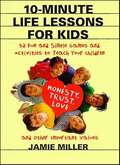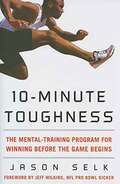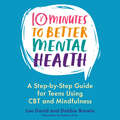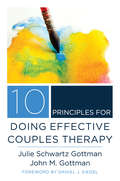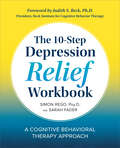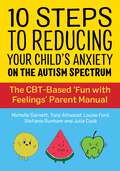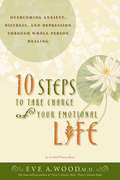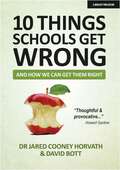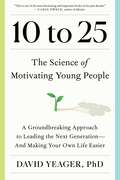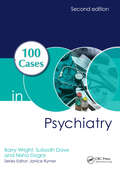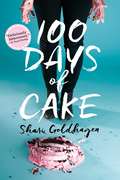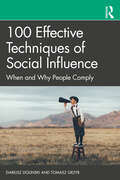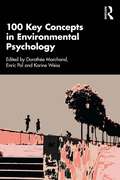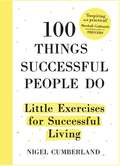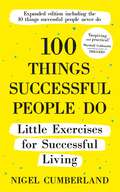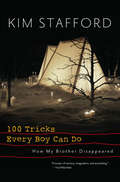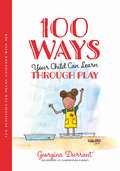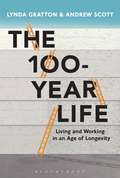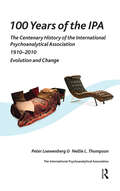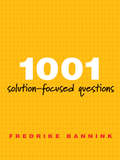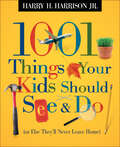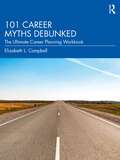- Table View
- List View
10-Minute Life Lessons for Kids: 52 Fun and Simple Games and Activities to Teach Your Children Honesty, Trust, Love, and Other Important Values
by Jamie C. Miller52 playful and easy to understand activites to hhelp parents teach children moral lessons that they won't forget A child says, "I hear and I forget, I see and I remember, I do and I understand." 10-Minute Life Lessons for Kids is a book about seeing and doing--a book that gives parents the ability to teach the powerful principles of honesty, trust, generosity, love, and other values. Children will discover the objectives themselves as they actively participate in fun games and activities. The games can be done in any order, with very little planning and with very few supplies--just common objects most people have around the house like toothpicks, string, pennies, or an apple. Some can be done while riding in the car, and others can be expanded to fill a whole evening with family fun. The activities in 10-Minute Life Lessons for Kids will not only create cozy and enjoyable moments of family togetherness, they will have a lasting impact on your growing child.
10-minute Toughness: The Mental Training Program for Winning Before the Game Begins
by Jason SelkMental training is a must for high performance both on the field and off. But simply hoping for mental toughness isn't going to build any mind muscles. You need a proven routine of daily exercises to get you where you want to go. 10-Minute Toughness is your personal coach for boosting brainpower and achieving a competitive edge in whatever game you play. With quickness and ease, you'll learn how to master your own mind and psych out your opponents using personalized techniques from one of America's most successful sport psychology consultants. Like no other program available, the 10-Minute Toughness (10-MT) routine gets you ready for the competition in just ten minutes a day.
10 Minutes to Better Mental Health: A Step-by-Step Guide for Teens Using CBT and Mindfulness
by Lee David Debbie BrewinWhat can you really do in 10 minutes? You can make a cup of tea or coffee, walk about 0.6 miles and now, with this book, you can improve your mental health.No matter how busy or stressful your day, with 10-minute steps and quick exercises, you can better understand your experiences and learn how to survive setbacks. The book covers everything from dealing with worry and anxiety and building your confidence, to creating healthy life habits and positive relationships. It includes sections to read, questions to reflect on, video clips to watch and things to try out in your everyday life. Using evidence-based approaches like CBT and mindfulness, it will help you to get the best out of life and become the person you want to be.(P) 2022 Jessica Kingsley Publishers
10 Principles for Doing Effective Couples Therapy (Norton Series on Interpersonal Neurobiology)
by Julie Schwartz Gottman John M. Gottman Daniel J. SiegelFrom the country’s leading couple therapist duo, a practical guide to what makes it all work. In 10 Principles for Doing Effective Couples Therapy, two of the world’s leading couple researchers and therapists give readers an inside tour of what goes on inside the consulting rooms of their practice. They have been doing couples work for decades and still find it challenging and full of learning experiences. This book distills the knowledge they've gained over their years of practice into ten principles at the core of good couples work. Each principle is illustrated with a clinically compiled case plus personal side-notes and storytelling. Topics addressed include: • You know that you need to “treat the relationship,” but how are you supposed to get at something as elusive as “a relationship”? • How do you empathize with both clients if they have opposite points of view? Later on, if they end up separating does that mean you’ve failed? Are you only successful if you keep couples together? • Compared to an individual client, a relationship is an entirely different animal. What should you do first? What should you look for? What questions should you ask? If clients give different answers, who should you believe? • What are you supposed to do with all the emotional and personal history that your clients stir up in you? • How can you make your work research-based? No one who works with couples will want to be without the insight, guidance, and strategies offered in this book.
The 10-Step Depression Relief Workbook: A Cognitive Behavioral Therapy Approach
by Sarah Fader Simon Rego PsyDDefeat depression in 10-steps with CBT-focused exercises from the Depression Relief Workbook. CBT therapy is an effective, evidence-based method to take control of your depression. In the Depression Relief Workbook, Dr. Simon Rego, a professor and expert in CBT therapy with over 20 years of experience treating depression, teams up with mental health advocate and CEO of Stigma Fighters, Sarah Fader, to break CBT therapy down into an easy-to-follow personalized program to help you heal from depression. Offering guidance and support, the Depression Relief Workbook gives you a practical and straightforward 10-step strategy to fight depression and keep it from coming back. Inside the Depression Relief Workbook you'll find: A Personal Plan providing guidance and relief for anyone suffering from mild to moderate depression, for use on their own, or in tandem with a larger therapy program A 10-Step Strategy to Get Better applying the most effective tools of CBT therapy to understand, identify, and break negative thought patterns Life Changing Exercises helping you define, combat, and overcome depression through activities, worksheets, questionnaires, and opportunities for reflection "In The 10-Step Depression Relief Workbook, Dr. Rego and Ms. Fader have taken the best of what decades of research on clinical treatment of depression has to offer and developed an accessible self-help program that will be useful not only to individuals experiencing depression, but also by practitioners looking for a helpful clinical supplement for their clients."—Christopher R. Martell, Ph.D., Co-Author of Overcoming Depression One Step at a Time
10 Steps to Reducing Your Child's Anxiety on the Autism Spectrum: The CBT-Based 'Fun with Feelings' Parent Manual
by Michelle Garnett Dr Anthony Attwood Louise Ford Julia Cook Stefanie RunhamRecognising, expressing and understanding emotions helps young children make sense of their life experiences. Children diagnosed with autism can have significant difficulties with recognising and processing emotions which can lead to high levels of anxiety as they struggle to make sense of the unpredictable world around them.The 'Fun with Feelings' programme is designed to help parents support their children with emotional regulation and to decrease anxiety. This guide is structured around 10 stages. The initial four stages prepare parents to implement the programme with their child. These stages help parents understand the causes of anxiety and provide practical strategies for creating a toolbox to reduce anxiety. The final six stages are used in conjunction with Having Fun with Feelings on the Autism Spectrum: A CBT Activity Book for Kids Age 4-8, allowing parents to support their child while working through the activity book.Written by world-leading experts in the field, 10 Steps to Reducing Your Child's Anxiety on the Autism Spectrum provides the steppingstones for parents of young children with autism to better understand their child's emotional skill set and empower them to understand and articulate their feelings.
10 Steps to Take Charge of your Emotional Life: Overcoming Anxiety, Distress, And Depression Through Whole-person Healing
by Eve A. WoodPsychiatrist, professor, and award-winning author Eve Wood trusts in your capacity to heal—to clear the way to a natural state of hope, harmony, and well-being. The insights and tools she shares in this book will enable you to identify and resolve your issues. Dr. Wood makes healing a simple process that anyone can understand. She walks you through ten steps that encompass examples, stories, exercises, and guidance. You’ll take stock of where you are and discover what you can do to transform your life. You’ll learn to address your negative thoughts and beliefs, make life choices that fit your nature, and develop strategies to support your innate capacity to heal. Whether you suspect that you’re suffering from a known condition or you simply want to understand yourself better, this insightful book is a path, a promise, and a prayer for that truly transformative way of healing to begin.
10 Things Schools Get Wrong (And How We Can Get Them Right)
by David Bott Jared Cooney HorvathWhat counterintuitive lessons can we learn from the meteoric rise of Mindset Theory in education? Why have computers so overwhelmingly failed to become the academic panacea many expected them to be? How can the simple act of assigning grades drive student narcissism and damage teacher professionalism?In this book, brain and behavioural research is combined with respected philosophy in order to place ten widely accepted yet rarely examined aspects of education under the microscope. - Teacher Expertise- Evidence-Based Practice- Grading- Homework- Mindset- 21st Century Skills- Computers- Rewards- Daily Organization- FunctionThis book aims to inspire teachers, leaders, and parents to question many commonly held beliefs and empower them to re-think the role of modern schooling.
10 Things Schools Get Wrong (And How We Can Get Them Right)
by David Bott Jared Cooney HorvathWhat counterintuitive lessons can we learn from the meteoric rise of Mindset Theory in education? Why have computers so overwhelmingly failed to become the academic panacea many expected them to be? How can the simple act of assigning grades drive student narcissism and damage teacher professionalism?In this book, brain and behavioural research is combined with respected philosophy in order to place ten widely accepted yet rarely examined aspects of education under the microscope. - Teacher Expertise- Evidence-Based Practice- Grading- Homework- Mindset- 21st Century Skills- Computers- Rewards- Daily Organization- FunctionThis book aims to inspire teachers, leaders, and parents to question many commonly held beliefs and empower them to re-think the role of modern schooling.
10 to 25: The Science of Motivating Young People: A Groundbreaking Approach to Leading the Next Generation—And Making Your Own Life Easier
by David YeagerAcclaimed developmental psychologist David Yeager reveals the new science of motivating young people ages ten through twenty-five in this groundbreaking book that is a must-read for managers, parents, educators, coaches, and mentors everywhere. &“Required reading for anyone who aspires to be a wise influence on the young people they care about.&” —Angela Duckworth &“One of the most fascinating and important books of the past decade...It will change millions of lives.&” —Carol Dweck &“This engaging, data-driven book is filled with practical insights.&” —Adam GrantImagine a world in which Gen Xers, millennials, and boomers interact with young people in ways that leave them feeling inspired, enthusiastic, and ready to contribute—rather than disengaged, outraged, or overwhelmed. That world may be closer than you think. In this book based on cutting edge research, psychologist David Yeager explains how to stop fearing young people&’s brains and hormones and start harnessing them. Neuroscientists have discovered that around age ten, puberty spurs the brain to crave socially rewarding experiences, such as pride, admiration, and respect, and to become highly averse to social pain, such as humiliation or shame. As a result, young people are subtly reading between the lines of everything we say, trying to interpret the hidden implications of our words to find out if we are disrespecting or honoring them. Surprisingly, this sensitivity to status and respect continues into the mid-twenties. 10 to 25 helps adults develop an ear for the difference between the right and wrong way to respect young people and avoid frustrating patterns of miscommunication and conflict. Yeager explains how to adopt what he terms the mentor mindset, which is a leadership style that&’s attuned to young people&’s need for status and respect. Anyone can adopt the mentor mindset by following a few highly effective and easy-to-learn practices such as validating young people&’s perspectives (rather than dismissing them), asking them questions (rather than telling them what to do), being transparent about your beliefs and goals (rather than assuming that they will accurately guess your thoughts), and holding them to high standards (rather than coddling them). Yeager&’s scientific experiments have shown these practices reduce a wide variety of behavior problems, including school dropout, unhealthy eating, stress, purposelessness, mental health problems, and more. One of the biggest misconceptions about mentoring is that it takes up too much time. On the contrary, those who use the mentor mindset end up with more time. Through back-and-forth conversations, young people feel empowered, and managers can transfer responsibility to them. Young people in this age group are poised to learn, grow, and accomplish incredible things—if only we can tap into the basic neurobiological systems that drive their motivation and behavior. An essential read for anyone who interacts with young people, 10 to 25 is a groundbreaking book that offers long-term strategies to help nurture well-adjusted, independent, accomplished young people who contribute to society in positive ways—all while making our own lives easier.
100 Cases in Psychiatry (100 Cases)
by Nisha Dogra Barry Wright Subodh DaveThe new edition of this best-selling title from the popular 100 cases series explores common psychiatric and mental health scenarios that will be encountered by the medical student and junior doctor during practical training on the ward, in the emergency department, in outpatient clinics and in the community, and which are likely to feature in qualifying examinations. The book covers a comprehensive range of presentations from hallucinations to self-harm, organized by sub-specialty area for ease of reference. Comprehensive answers highlight key take home points from each case and provide practical advice on how to deal with the challenges that occur when practising psychiatry at all levels.
100 Days of Cake
by Shari GoldhagenGet well soon isn't going to cut it in this quirky and poignant debut novel about a girl, her depression, an aggressive amount of baked goods, and the struggle to simply stay afloat in an unpredictable, bittersweet life.Every other senior at Cove High School might be mapping out every facet of their future, but Molly Bryne just wants to spend the rest of the summer (maybe the rest of her life) watching Golden Girls reruns and hanging out with her cute coworker at FishTopia. Some days, they are the only things that get her out of bed. You see, for the past year, Molly's been struggling with depression, above and beyond industry-standard teen angst. Crushing on her therapist isn't helping, and neither is her mom, who is convinced that baking the perfect cake will cure her--as if icing alone can magically make her rejoin the swim team or care about the SATs. Ummm, no, not going to happen. But when Molly finds out FishTopia is turning into a lame country diner, her already crummy life starts to fall even more out of her control, and soon she has to figure out what-- if anything--is worth fighting for. 100 Days of Cake is a quirky and poignant story of a girl, her depression, an aggressive amount of baked goods, and the struggle to simply stay afloat in an unpredictable, bittersweet world.
100 Effective Techniques of Social Influence: When and Why People Comply
by Dariusz Dolinski Tomasz Grzyb100 Effective Techniques of Social Influence provides a revolutionary look into the effectiveness of many techniques of social influence, providing an overview of the ways in which people use techniques to persuade others to meet various requests, suggestions, and commands. For each technique, the authors explore the idea behind it, what empirical research says about it, and what the psychological mechanism behind its effectiveness is, aka, why it works. The techniques included span across multiple areas in people’s everyday lives, ranging from business negotiations, managements, marketing, and close relationships, to people’s behavior in public as well as in their private sphere. Covering research from the 1970s to the present day, the book describes techniques of social influence with the purpose of provoking certain behaviors, such as convincing an individual to donate to a charity or purchase a certain product. By exclusively focusing on techniques influencing human behaviors, rather than beliefs, biases, or emotions, the authors show how humans can be reliably convinced to behave in a certain way in a huge range of situations and contexts. Rather than being based on anecdotal evidence or legends of famous people, the authors have only included techniques that have been proven to be effective through scientific research. With each technique described in an engaging manner, this is ideal reading for students and academics in fields such as social psychology, leadership, marketing, sociology, management, and communication. It will also appeal to professionals who need to influence others, and any readers who desire a better and more contemporary understanding of how people interact and influence others on a daily basis.
100 Key Concepts in Environmental Psychology
by Dorothée MarchandThis accessible book defines 100 key concepts, ideas and processes in Environmental Psychology to provide an introductory reference work that brings together research and theory in a bite-size format. With contributions from leading figures within Environmental Psychology, each concept is clearly defined and explained within the context of issues around the environment, sustainability, climate change, nature and architecture. This book considers the involvement of psychological, physiological and social processes to understand the mechanisms that explain and contribute to the evolution of behavior and attitudes that relate to our relationship with the environment. Concepts covered include biodiversity, eco-anxiety, place identity, sustainable behaviour, climate justice and environmental attitudes. By integrating ideas from different disciplinary orientations in the field of Environmental Psychology, this book allows for a better understanding of the processes related to the individual-environment relationship, as well as the applications that they allow for in various fields of intervention. This is essential reading for students and researchers in Environmental Psychology, Sustainability Studies, Architecture and Built Environment Studies and related fields.
100 Things Successful People Do: Habits, Mindsets And Activities For Creating Your Own Success Story
by Nigel Cumberland100 Things Successful People Do is a guidebook to achieving success in any aspect of your life. You will discover the habits that are common to successful people and find out how to adopt them into your own life so that you can be successful too. Mixing simple instructions with activities to get you started, whether you are looking to succeed in your family life, at work, in sports, at school or in retirement, you will find, mindsets, habits and techniques here that will help you get the results you want.
100 Things Successful People Do: Little Exercises for Successful Living: 100 Self Help Rules for Life
by Nigel CumberlandEXPANDED EDITION FEATURING 10 BRAND NEW CHAPTERS: THE 10 THINGS SUCCESSFUL PEOPLE NEVER DO** 100 THINGS SUCCESSFUL PEOPLE DO: NOW AN INTERNATIONAL BESTSELLER!** TRANSLATED IN 20 LANGUAGES WORLDWIDE'Inspiring and practical' MARSHALL GOLDSMITH, bestselling author of TRIGGERSYOUR GUIDE TO CREATING A SUCCESSFUL LIFE100 Things Successful People Do is your guide to successful living. Mixing simple instructions with activities to get you started, whether you are looking to succeed in your family life, at work, in sports, at school or in retirement, you will find mindsets, habits, and techniques here that will help you get the results you want.100 Things Successful People Do is packed with great ideas for working smart and living well, all carefully chosen to help you achieve any kind of success you can imagine. You will discover the habits that are common to successful people and find out how to use them in your own life.Every chapter features a new idea that will help you get closer to your goals. Mixing simple descriptions with activities and exercises, you will learn the optimal mindset and habits you need to succeed in work and life.And this expanded edition now features a brand new section revealing the 10 things that successful people never do.
100 Tricks Every Boy Can Do
by Kim StaffordBret and Kim Stafford, the oldest children of the poet and pacifist William Stafford, were pals. Bret was the good son, the obedient public servant, Kim the itinerant wanderer. In this family of two parent teachers, with its intermittent celebration of "talking recklessly," there was a code of silence about hard things: "Why tell what hurts?" As childhood pleasures ebbed, this reticence took its toll on Bret, unable to reveal his troubles. Against a backdrop of the 1960s - puritan in the summer of love, pacifist in the Vietnam era - Bret became a casualty of his interior war and took his life in 1988. 100 Tricks Every Boy Can Do casts spells in search of the lost brother: climbing the water tower to stand naked under the moon, cowboys and Indians with real bullets, breaking into church to play a serenade for God, struggling for love, and making bail. In this book, through a brother's devotions, the lost saint teaches us about depression, the tender ancestry of violence, the quest for harmonious relations, and finally the trick of joy.
100 Tricks Every Boy Can Do
by Kim StaffordBret and Kim Stafford, the oldest children of the poet and pacifist William Stafford, were pals. Bret was the good son, the obedient public servant, Kim the itinerant wanderer. In this family of two parent teachers, with its intermittent celebration of "talking recklessly," there was a code of silence about hard things: "Why tell what hurts?" As childhood pleasures ebbed, this reticence took its toll on Bret, unable to reveal his troubles. Against a backdrop of the 1960s - puritan in the summer of love, pacifist in the Vietnam era - Bret became a casualty of his interior war and took his life in 1988. 100 Tricks Every Boy Can Do casts spells in search of the lost brother: climbing the water tower to stand naked under the moon, cowboys and Indians with real bullets, breaking into church to play a serenade for God, struggling for love, and making bail. In this book, through a brother's devotions, the lost saint teaches us about depression, the tender ancestry of violence, the quest for harmonious relations, and finally the trick of joy.
100 Ways Your Child Can Learn Through Play: Fun Activities for Young Children with SEN
by Georgina DurrantPacked full of 100 creative and engaging activities for young children with special educational needs, this book enables you to have fun and enjoy developing your child's skill-based learning with them.From building biscuit construction sites and rainbow ice towers to playing dentists, nail salons and post office workers, the variety and creativity featured on every page of this book means you'll never have a dull day with your child again! With activities for rainy days, in the garden, on walks and more, there's something new to learn wherever you go.With charming black and white line illustrations to depict each activity, this is a great way to connect with your children with SEN, while building their life skills at the same time.
\The 100-Year Life: Living And Working In An Age Of Longevity
by Lynda Gratton Andrew ScottWhat will your 100-year life look like?Does the thought of working for 60 or 70 years fill you with dread? Or can you see the potential for a more stimulating future as a result of having so much extra time?Many of us have been raised on the traditional notion of a three-stage approach to our working lives: education, followed by work and then retirement. But this well-established pathway is already beginning to collapse - life expectancy is rising, final-salary pensions are vanishing, and increasing numbers of people are juggling multiple careers. Whether you are 18, 45 or 60, you will need to do things very differently from previous generations and learn to structure your life in completely new ways. The 100-Year Life is here to help. Drawing on the unique pairing of their experience in psychology and economics, Lynda Gratton and Andrew Scott offer a broad-ranging analysis as well as a raft of solutions, showing how to rethink your finances, your education, your career and your relationships and create a fulfilling 100-year life. #65533; How can you fashion a career and life path that defines you and your values and creates a shifting balance between work and leisure?#65533; What are the most effective ways of boosting your physical and mental health over a longer and more dynamic lifespan?#65533; How can you make the most of your intangible assets - such as family and friends - as you build a productive, longer life?#65533; In a multiple-stage life how can you learn to make the transitions that will be so crucial and experiment with new ways of living, working and learning?Shortlisted for the FT/McKinsey Business Book of the Year Award, The 100-Year Life is a wake-up call that describes what to expect and considers the choices and options that you will face. It is also fundamentally a call to action for individuals, politicians, firms and governments and offers the clearest demonstration that a 100-year life can be a wonderful and inspiring one.
100 Years of the IPA: The Centenary History of the International Psychoanalytical Association 1910-2010: Evolution and Change
by Peter LoewenbergThis book offers a close glimpse of the nuanced dialectic between major psychoanalytic concepts and the sociopolitical environments in which such ideas were germinated, spread, took roots, and further evolved.
1001 Solution-Focused Questions: Handbook for Solution-Focused Interviewing
by Fredrike BanninkAn invaluable resource for conducting successful solution-focused therapy. Drawing on nearly 30 years of clinical practice, Bannink compiles solution-focused questions and protocols that are formulated to elicit the client's expertise on the issue(s) that brought him or her to therapy. Categorized for general use and for use with specific types of clients--such as children, couples, and families, and those who have suffered trauma or who might benefit from medication--the questions demonstrate how the precise use of language is an important tool in solution-focused interviewing. Exercises and homework suggestions invite self-reflection and experimentation with the solution-focused model, while case studies illustrate the model's effectiveness with a wide variety of clients. 1001 Solution-Focused Questions equips clinicians with a toolbox full of ready-to-use approaches, so they're prepared to provide support as clients find their own way to a better future.
1001 Things Your Kids Should See & Do (or Else They'll Never Leave Home)
by Harry H. Harrison Jr.When it's time for your kids to leave home, will they be ready to face the world? Will they be able to handle the NYC subway system? Will they have experienced the challenge of a summer career camp? Will they be able to compare civilizations and governments around the world? Will their imaginations have been sparked in a foreign land? Will they know that tamales aren't edible until they take the cornstalk off? In 1001 Things Your Kids Should See & Do Before They Leave Home, best-selling author Harry H. Harrison Jr. has compiled the definitive book for preparing a child for adulthood. There's so much to do…and so little time.
101 Career Myths Debunked: The Ultimate Career Planning Workbook
by Elizabeth L. CampbellWhat if everything you know about careers is false? Bombarded by toxic misinformation about unemployment and failing career prospects, job hunters are often halted by fear. 101 Career Myths Debunked is essential reading for college students, job hunters, and career changers to discover the myths holding them back and reveal the surprising truths and practical steps that will set them on the path to career success. Written by a counseling psychologist and career psychology expert, 101 Career Myths Debunked is your personal career coach and ultimate planning guide. This easy-to-use workbook will show you how to boost your confidence and build a life you love. It walks you through the entire career development process and helps you deal successfully with everything you need to consider. You’ll learn practical new ways to move forward from your present uncertainty into a promising future.
101 Career Myths Debunked: The Ultimate Career Planning Workbook
by Elizabeth L. CampbellWhat if everything you know about careers is false? Bombarded by toxic misinformation about unemployment and failing career prospects, job hunters are often halted by fear. 101 Career Myths Debunked is essential reading for college students, job hunters, and career changers to discover the myths holding them back and reveal the surprising truths and practical steps that will set them on the path to career success.Written by a counseling psychologist and career psychology expert, 101 Career Myths Debunked is your personal career coach and ultimate planning guide. This easy-to-use workbook will show you how to boost your confidence and build a life you love. It walks you through the entire career development process and helps you deal successfully with everything you need to consider. You’ll learn practical new ways to move forward from your present uncertainty into a promising future.
